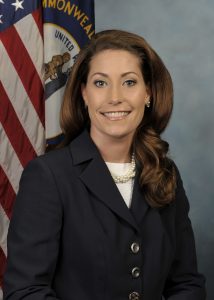
Photo: Secretary of State website
The candidate filing period for the 2018 election cycle has opened, Secretary of State Alison Lundergan Grimes announced Wednesday, and she is encouraging potential candidates to use a new filing portal on the Secretary of State’s website.
“The 2018 election cycle is what’s known in Kentucky as a county election year, so it will feature thousands of candidates,” said Grimes, Kentucky’s chief elections official. “As Secretary of State, we’ve launched online voter registration and made military voting easier with the use of technology, so it’s natural that we tackle making the filing process simpler for candidates with a new filing portal online.”
The Secretary of State’s online Becoming a Candidate portal allows potential candidates to use a streamlined web application to fill out much of the paperwork required to become a candidate. At the end of the process, users may save and print a PDF of the required documents for filing with the appropriate filing official. Kentucky law does not currently allow candidates to submit filings electronically.
The portal also allows potential candidates to print blank filing forms or to request forms by mail.
The 2018 ballot will feature Kentucky’s six seats in the U.S. House of Representatives as well as the 100 seats in the Kentucky House of Representatives and seats in even districts in the Kentucky Senate. The judicial slate includes the Kentucky Supreme Court’s third district, Kentucky’s District Judges, and all Commonwealth’s Attorneys and Circuit Court Clerks. On the local level, all county officers will be up for election along with city legislative bodies and mayors of some cities.
The deadline for filing for offices that may have a primary is 4 p.m. local time on January 30, 2018. Independent, political group, or political organization candidates for offices that require a statement of candidacy must file by 4 p.m. local time on April 2, 2018.
Persons interested in becoming a candidate for any office can find more information on the Secretary of State’s online Becoming a Candidate portal at sos.ky.gov.

Photo: State Treasurer website
Kentucky State Treasurer Allison Ball was selected as one of twenty-five participants for The Governing Institute’s 2018 Women in Government Leadership Program.
“It is an honor to be selected for The Governing Institute’s Women in Leadership Program,” Treasurer Ball said. “We need more women to run for office and I am proud to be a part of this program that encourages women to assume a greater level of leadership.”
The Women in Leadership Program brings together elected female leaders from across the nation to acknowledge their contributions, create a forum to discuss leadership, and seek their help in mentoring the next generation of female leaders to run for office. Each class also includes one rising star, a young woman not yet serving in elected office, but with the interest and potential to run in the future.
The Governing Institute is a division of e.Republic, the nation’s only media and research company focused exclusively on state and local government and education. Governing focuses on improving government performance and outcomes through research, decision support, and executive education to help public sector leaders govern more effectively.
“The women in the Class of 2018 are subject matter experts, negotiators, civic activists, and pioneers,” said Julia Burrows, director of the Governing Institute. Nominations were received for nearly 150 women for the Class of 2018. The class was selected based on career and educational accomplishments, personal recommendations, a commitment to actively participate and the goal of seating a diverse class. The 25 women in the program’s new class will be profiled in the February 2018 issue of Governing magazine and will participate in Governing events throughout the coming year.
 Louisville Metro Government has filed a federal lawsuit against the three largest wholesale opioid distribution companies – Cardinal Health, AmerisourceBergen, and McKesson – for dumping millions of pills into Louisville neighborhoods while refusing to fulfill their obligations to monitor, identify, report and halt suspicious shipments of opioids.
Louisville Metro Government has filed a federal lawsuit against the three largest wholesale opioid distribution companies – Cardinal Health, AmerisourceBergen, and McKesson – for dumping millions of pills into Louisville neighborhoods while refusing to fulfill their obligations to monitor, identify, report and halt suspicious shipments of opioids.
The suit, filed today in U.S. District court under the direction of Mayor Greg Fischer and Jefferson County Attorney Mike O’Connell, seeks damages to help Louisville combat the opioid public health crisis that has impacted Louisville and has led to everything from overdose deaths to increased crime in the city.
Wholesale Distributors Cardinal Health, AmerisourceBergen, and McKesson, which together have annual revenues of $400 billion and which control 85 percent of the wholesale market share, profited greatly from the opioid epidemic. In the meantime, Louisville is struggling with the toll opioid abuse is taking on family, friends, neighbors, and public resources.
From 2012 through the middle of 2017, more than 197 million doses of prescription opioids were dispensed in Jefferson County. That is more than 258 doses of prescription opioids for every man, woman, and child in Louisville. During this same time period, more than 3.5 million doses of overdose antidotes, including naloxone, have been dispensed in Jefferson County, nearly 5 per person. There were 364 overdose deaths in Louisville in 2016.
“There is no question our taxpayers — all 760,000 Louisville citizens — are shouldering the financial responsibility for the opioid crisis,” Fischer said.
Kentucky has seen a deadly spike in opioid overdoses and deaths that are impacting families and local communities, with Louisville hit especially hard. In January of 2017 alone, Louisville’s Metro Emergency Services answered 695 opioid related overdose calls, an average of 22 a day. The U.S. Centers for Disease Control and Prevention have seen drug overdose death rates increase more than 72 percent, from 2014 to 2015. Drug overdose is now the leading cause of death for those under 50.
In addition to the cost in human life, researchers estimate the nationwide total economic burden of the prescription opioid epidemic at $78.5 billion. The opioid epidemic is creating pressure on health care facilities as well as law enforcement agencies, resulting in rising costs, a strain on resources, and concerns about public safety.
Congress put Wholesale Distributors in a position of trust as gatekeepers because opioids are highly addictive and Congress knew there was a significant likelihood for abuse. As the gatekeepers of highly addictive opioids, the Wholesale Distributors breached their duties to monitor and report suspicious shipments of opioids and instead profited from the flood of pills into our community, leaving our taxpayers to clean up the mess they caused, according to the lawsuit.
Fischer and O’Connell want to put a stop to the problem by dramatically reducing the flow of prescription opioid painkillers into the community and making the wrongdoers pay for the treatment. The opioid epidemic has grown worse as people who were addicted to prescription pills have, thanks to heightened enforcement efforts, found them harder to come by. But the residents of Louisville and Jefferson County continue to bear the burden of the cost of the epidemic, as the costs of treatment for addiction, education and law enforcement have continued to rise. According to a federal study, roughly 1 in 7 people who received a refill or had a second opioid prescription authorized were still on opioids one year later.
“We have a lost generation of people addicted to opiates, and many have now migrated to heroin,” said Mayor Fischer. “Wholesale Distributors need to be held accountable for this epidemic by cleaning up the mess they’ve created through treatment for those struggling with addiction, educating our youth to understand the danger of opioid abuse, and keeping our communities safe.”
The issue is personal for O’Connell, whose son died of an overdose in 2014 at the age of 33.
“Matt’s death left a hole that, for a parent, I don’t think can ever fully heal,” O’Connell, said. “This lawsuit is a chance at some small piece of justice for my son Matt, and for the countless families who have been decimated by the opioid plague and the grip of addiction.”
“Our citizens are being hospitalized and are dying because of opioid addiction, and city government is struggling to respond and help,” Mayor Fischer added.
The city has hired a number of highly successful law firms, experienced in holding the powerful pharmaceutical industry accountable. Those firms include Levin Papantonio, Greene Ketchum, Baron & Budd, McHugh Fuller Law Group, Hill Peterson, Bowling and Johnson PLLC and Gray & White Law.
The law firms are taking the case at no cost to taxpayers. The firms will be paid only if they are successful in the lawsuit, O’Connell said, and would be awarded 30 percent of any monies recovered.
 Citizens interested in adding their voice to the review of public art that could be interpreted to honor bigotry, discrimination, racism and/or slavery now have an online forum to share their thoughts.
Citizens interested in adding their voice to the review of public art that could be interpreted to honor bigotry, discrimination, racism and/or slavery now have an online forum to share their thoughts.
People can visit https://louisvilleky.gov/government/public-art/public-art-review and add their thoughts to the public conversation.
“Getting citizens input from all sides is important – we want to hear from a wide variety of people,” Mayor Greg Fischer said.
On Sunday, Fischer announced that he asked the Louisville Commission on Public Art to review its catalogue of art in the public right of way to develop a list of those tied to discrimination, racism and slavery, in preparation for a community conversation about their display.
The Mayor’s remarks come after a day of violence surrounding a white nationalists rally in Charlottesville, Va., that left three people dead and 35 injured. The review also came after a statue of Confederate officer John Breckinridge Castleman in the Cherokee Triangle neighborhood was vandalized.
“For many, the Castleman statue is a beloved neighborhood landmark, but for others, it’s a symbol of a painful, tragic and divisive time in our history — which gets at the complexity of this conversation,” the Mayor said.
Sarah Lindgren, the city’s public art administrator, said the Commission on Public Art will announce before the week’s end a series of public meetings to gather further input.
“This is an opportunity for citizens to both speak and listen,” Lindgren said.
 From Mayor Greg Fischer:
From Mayor Greg Fischer:
On Sunday, Aug. 13, our city hosted three separate rallies in support of the people of Charlottesville, Va., and in opposition of the acts of domestic terrorism that occurred there over the weekend.
I’m extremely proud that all of those events were peaceful. I’m proud of the marchers and grateful that the hundreds who participated were kept safe. And I appreciate the work of Louisville Metro Police Chief Steve Conrad and his officers to help ensure that safety.
I recognize, however, that some people were upset by steps that officers took to route people off the street and onto sidewalks during a Black Lives Matter march down Broadway after one of the rallies. When I first saw the photos and videos, I too, had concerns, which I shared with Chief Conrad on Sunday night.
It is important to keep in mind that the officers’ responsibility was to keep people safe from traffic, to provide a safe space for them to march and to provide security in the event that counter-protesters emerged. And they were successful in those efforts.
Officers are trained to use a baton in the event that a horizontal police barricade is required in situations like this. I appreciate, though, that the batons prompted feelings of fear and mistrust among many of the marchers, their families and friends, as well as some who saw the images later.
That’s a reality we cannot ignore. And that’s why I asked the Chief to review how we should best handle incidents like this should they happen in the future.
This review has started, and we will share its results with the community.
I take great pride in the willingness of Louisvillians to come together to talk out our differences and our challenges, no matter how difficult.
LMPD strives to be the most effective community partners they can be, and I reiterate my appreciation for their service and their desire to always improve.
I also ask our marchers to maximize effective communication and cooperation with LMPD, with peace, safety and constitutional rights for all being the guiding values.
I believe that trust in our community comes from transparency, and I commit that we will continue with transparency as one of my administration’s values.
 Mayor Greg Fischer announced today that he’s directing the Louisville Commission on Public Art to review its catalogue of public art to develop a list of pieces that can be interpreted to be honoring bigotry, racism and/or slavery. This is in preparation for a community conversation about their display.
Mayor Greg Fischer announced today that he’s directing the Louisville Commission on Public Art to review its catalogue of public art to develop a list of pieces that can be interpreted to be honoring bigotry, racism and/or slavery. This is in preparation for a community conversation about their display.
“I recognize that some people say all these monuments should be left alone, because they are part of our history,” Fischer said. “But we need to discuss and interpret our history from multiple perspectives and from different viewpoints. That’s why a community conversation is crucial.”
“Both our human values and the future of our city depend on our ability to directly address the challenges that stop each and every citizen from realizing their potential. We, as a compassionate community, must again come together and face up to the stain of slavery and racism, as we move toward a future that embraces diversity as a strength,” the Mayor said.
The Mayor’s remarks come one day after violence surrounding a white nationalists’ rally in Charlottesville, VA that left three people dead and 35 injured — and nearly a year after the city removed the Confederate Monument at the University of Louisville. The Virginia rally was convened by white nationalists who oppose a plan to remove a statue of Confederate Gen. Robert E. Lee from a city park.
Early this morning, a statue of Confederate officer and President of the Board of Park Commissioners John Breckinridge Castleman in the Cherokee Triangle neighborhood was vandalized with orange paint. The statue, constructed in 1913, has long been a neighborhood landmark honoring Castleman’s contributions to creating the neighborhood around it, and the Cherokee Neighborhood Association paid thousands to have it restored in 2013.
“For many, this statue is a beloved neighborhood landmark, but for others, it’s a symbol of a painful, tragic and divisive time in our history — which gets at the complexity of this conversation,” the Mayor said. “I believe this is community conversation worth having.”
An effort to remove the paint from the Castleman statue today was halted until the conservator who led its restoration in 2013 could be consulted. The city also is reaching out to the Kentucky Historical Society to discuss how to address vandalism to a nearby sign that the city maintains.
The Confederate Monument on U of L’s campus was moved last fall to become part of an historic Civil War site in neighboring Brandenburg, KY
Attorney General Andy Beshear and 20 other state attorneys general have submitted public comments to Education Secretary Betsy DeVos, calling a move by the U.S. Department of Education to replace existing student protections a “waste of resources and a betrayal of students.”
The July 12 comments are in response to the department’s June 14 announcement of intentions to delay large portions of the Borrower Defense Rule, which was designed to hold abusive higher education institutions accountable for cheating students and taxpayers out of billions of dollars in federal loans.
According to the attorneys general, the Borrower Defense Rule was created in large part by state and federal investigations into for-profit schools like the now-defunct Corinthian Colleges, and was finalized after robust and thorough negotiated rulemaking with input from numerous stakeholders.
Beshear said the department announced it would withdraw the Rule without soliciting, receiving or responding to any comment from the public, and without engaging in the required process.
“It is my hope that the department will not cast aside all the hard work and progress achieved during its previous rulemakings and turn its back on the critical protections it promised to borrowers,” Beshear said. “Attorneys general and all the stakeholders must continue to pressure the department to protect students from abuse at the hands of predatory schools.”
Under the Borrower Defense Rule, a successful enforcement action against a school by a state attorney general entitles borrowers to obtain loan forgiveness, and enables the Department of Education to seek repayment of any amounts forgiven from the school.
The attorneys general also oppose the department’s efforts to replace the Gainful Employment Rule, which empowers students to make informed decisions about their education and protects students from programs that will leave them with burdensome debt and poor job prospects.
For-profit colleges AGs have investigated and taken enforcement actions against include: American Career Institute; Ashford University/Bridgepoint Education Inc.; Corinthian Colleges Inc.; Career Education Corporation; Education Management Corporation; Daymar College; DeVry University; ITT Tech; National College of Kentucky and Westwood Colleges.
Beshear’s office is committed to holding for-profit colleges accountable in Kentucky and is working to help defrauded students.
- In December 2016, Beshear announced nearly 3,500 former students of Daymar College’s Kentucky campuses and online programs will receive restitution checks totaling $1.2 million. The payments are pursuant to a settlement agreement the Office of the Attorney General entered into with Daymar in 2015 resolving a consumer protection lawsuit.
- In August 2016, Beshear announced that the Kentucky Court of Appeals had affirmed a previous order by Franklin Circuit Court requiring National College of Kentucky Inc. and its attorneys to pay the state a combined $157,000 in civil monetary sanctions. The Kentucky Supreme Court declined in April to take up National College’s request to overturn the appeals’ court decision.
- In March 2016, Beshear joined seven other state attorneys general in asking the U.S. Department of Veterans Affairs to restore educational and vocational benefits to thousands of veterans victimized by Corinthian Colleges Inc. for predatory practices. Kentucky veterans are among the 2,000 students who received letters from Beshear regarding their federal loans.
Beshear said students who have been a victim of a for-profit college may contact his office by phone, 502-696-5300, or by completing a complaint form.
 Weather
Weather Traffic
Traffic @LouisvilleDispatch
@LouisvilleDispatch @LouisvilleDisp
@LouisvilleDisp Subscribe
Subscribe